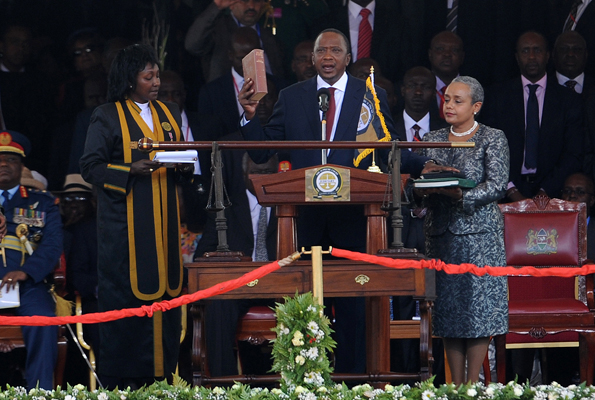Dignitaries and tens of thousands of people witnessed the inauguration at a stadium in the capital, Nairobi.
Mr Odinga did not attend the ceremony after his attempt to overturn Mr Kenyatta's victory in court failed.
Mr Kenyatta and his deputy, William Ruto, face charges at the International Criminal Court relating to post-election violence five years ago.
They were on opposite sides at the time and both deny the accusations.
Sudanese President Omar al-Bashir, who faces an ICC arrest warrant over the conflict in Darfur, is not in Nairobi for the inauguration.
Mr Kenyatta is the son of Kenya's founding father, Jomo Kenyatta, and is heir to one of the largest fortunes in Kenya.
'Peace'
He served as deputy prime minister, minister for trade, and finance minister under outgoing President Mwai Kibaki.
The 51 year old will be Kenya's youngest president.
The crowd, waving Kenyan flags, burst into rapturous welcome as he took the oath of office.
Among the African leaders present for the inauguration were South Africa's Jacob Zuma, Nigeria's Goodluck Jonathan and Uganda's Yoweri Museveni.
Mr Odinga - the outgoing prime minister - is on holiday in South Africa, while other senior members of his Coalition for Reforms and Democracy (Cord) party have also stayed away to signal their opposition to Mr Kenyatta's presidency, correspondents say.
According to official results, Mr Kenyatta beat Mr Odinga by 50.07% to 43.28% in March, avoiding a run-off by just 8,100 votes.
Mr Odinga challenged the result, but said he would respect the Kenyan Supreme Court's ruling in Mr Kenyatta's favour.
After the ruling, Mr Kenyatta said his government would "work with and serve all Kenyans without any discrimination whatsoever".
"Above all, let us continue to pray for peace in our country," he said.
The election was Kenya's first after a disputed poll in 2007, which led to violence that left more than 1,200 people dead.
Mr Kenyatta is due to appear at the ICC for his trial in The Hague later this year, accused of crimes against humanity. He denies the charges.
Kenya is a party to the Rome Statute, the treaty which established the ICC in 2002.
But like most African countries, it has refused to enforce the ICC warrant for Mr Bashir's arrest.
Earlier, Kenyan government spokesman Muthui Kariuki told the BBC that Mr Bashir had been invited and would not be arrested if he accepted the invitation.
After Mr Bashir visited Kenya in 2010, a Kenyan court ruled that the government must arrest him if he returned, in line with its international obligations under the Rome Statute.
The government is appealing against the ruling.
Museveni attacks ICC at Uhuru’s swearing-in
Kampala
President Museveni yesterday lashed out at the International Criminal Court (ICC), saying it has been “grabbed by a bunch of self seekers and shallow minded people whose interests is to mint revenge on those who hold opposing views.”
Without specifying the “ICC grabbers, self seekers and shallow minded people”, President Museveni said the election of Mr Uhuru Kenyatta and his deputy, Mr William Ruto, is a reminder to those using the ICC to blackmail others (African leaders) for selfish reasons that Africa is not a haven for them.
The President was among dignitaries attending President Kenyatta’s inauguration ceremony at Moi International Sports Centre in Nairobi yesterday. “I want to salute the Kenyan voters on one other issue—the rejection of the blackmail by the International Criminal Court (ICC) and those who seek to abuse this institution for their own agenda,” Mr Museveni said. He continued: “I was one of those that supported the ICC because I abhor impunity. However, the usually opinionated and arrogant actors using their careless analysis have distorted the purpose of that institution
They are now using it to install leaders of their choice in Africa and eliminate the ones they do not like.”
According to President Museveni, what happened in Kenyan election in 2007, where more than 1,000 people were killed, was not just regrettable but must be condemned. However, in his view, the external legalistic process happening at Hague is not the solution to the electoral violence or the African problems.
The President’s advice
He said: “Events of this nature first and most importantly, need an ideological solution by discerning why they happened. Why did inter-community violence occur? Was it for genuine or false reasons?” He added that instead of a thorough and thoughtful process, individuals are engaged in legal gymnastics!
Citing Uganda’s case, he said between 1966 and 1986, the country lost about 800,000 people, but it was not the ICC or the UN that helped the country deal with the sad chapter of the country’s history. “We only referred Joseph Kony of LRA to the ICC because he was operating outside Uganda. Otherwise, we would have handled him ourselves,” said President Museveni.
iladu@ug.nationmedia.com
















